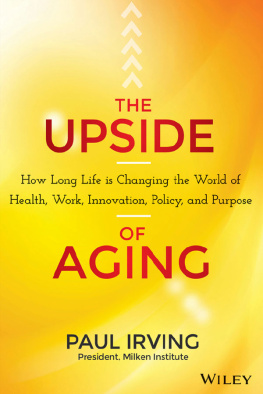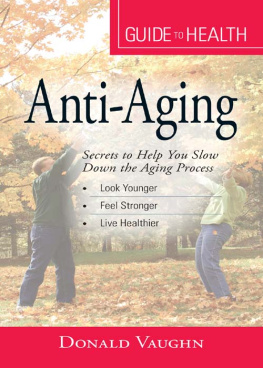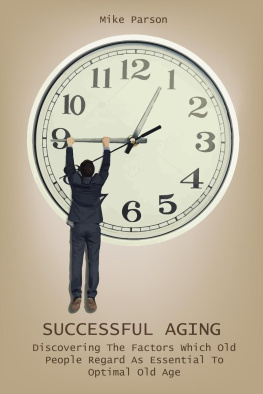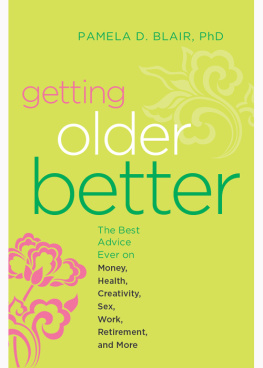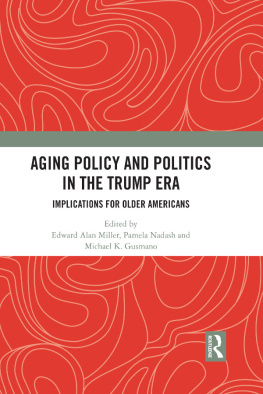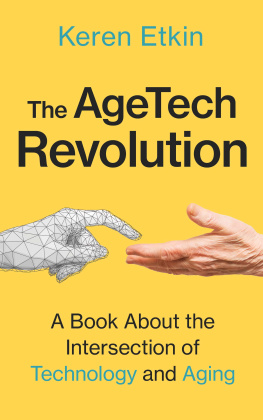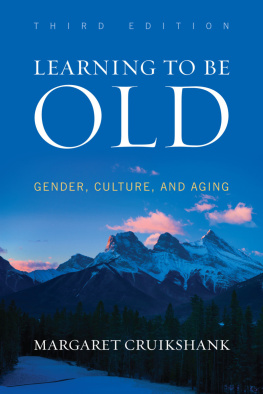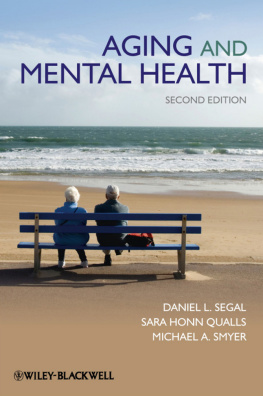Paul Irving - The Upside of Aging: How Long Life Is Changing the World of Health, Work, Innovation, Policy and Purpose
Here you can read online Paul Irving - The Upside of Aging: How Long Life Is Changing the World of Health, Work, Innovation, Policy and Purpose full text of the book (entire story) in english for free. Download pdf and epub, get meaning, cover and reviews about this ebook. year: 2014, publisher: Wiley, genre: Politics. Description of the work, (preface) as well as reviews are available. Best literature library LitArk.com created for fans of good reading and offers a wide selection of genres:
Romance novel
Science fiction
Adventure
Detective
Science
History
Home and family
Prose
Art
Politics
Computer
Non-fiction
Religion
Business
Children
Humor
Choose a favorite category and find really read worthwhile books. Enjoy immersion in the world of imagination, feel the emotions of the characters or learn something new for yourself, make an fascinating discovery.
- Book:The Upside of Aging: How Long Life Is Changing the World of Health, Work, Innovation, Policy and Purpose
- Author:
- Publisher:Wiley
- Genre:
- Year:2014
- Rating:4 / 5
- Favourites:Add to favourites
- Your mark:
The Upside of Aging: How Long Life Is Changing the World of Health, Work, Innovation, Policy and Purpose: summary, description and annotation
We offer to read an annotation, description, summary or preface (depends on what the author of the book "The Upside of Aging: How Long Life Is Changing the World of Health, Work, Innovation, Policy and Purpose" wrote himself). If you haven't found the necessary information about the book — write in the comments, we will try to find it.
The Upside of Aging: How Long Life Is Changing the World of Health, Work, Innovation, Policy and Purpose explores a titanic shift that will alter every aspect of human existence, from the jobs we hold to the products we buy to the medical care we receive - an aging revolution underway across America and the world. Moving beyond the stereotypes of dependency and decline that have defined older age, The Upside of Aging reveals the vast opportunity and potential of this aging phenomenon, despite significant policy and societal challenges that must be addressed. The books chapter authors, all prominent thought-leaders, point to a reinvention and reimagination of our older years that have critical implications for people of all ages.
With a positive call to action, the book illuminates the upside for health and wellness, work and volunteerism, economic growth, innovation and education. The authors, like the baby boom generation itself, posit new ways of thinking about aging, as longevity and declining birthrates put the world on track for a mature population of unprecedented size and significance. Among topics they examine are:
- The emotional intelligence and qualities of the aging brain that science is uncovering, senior moments notwithstanding.
- The new worlds of genomics, medicine and technology that are revolutionizing health care and wellness.
- The aging populations massive impact on global markets, with enormous profit potential from an explosion in products and services geared toward mature consumers.
- New education paradigms to meet the needs and aspirations of older people, and to capitalize on their talents.
- The benefits that aging workers and entrepreneurs bring to companies, and the crucial role of older people in philanthropy and society.
- Tools and policies to facilitate financial security for longer and more purposeful lives.
- Infrastructure and housing changes to create livable cities for all ages, enabling aging in place and continuing civic contribution from millions of older adults.
- The opportunities and potential for intergenerational engagement and collaboration.
The Upside of Aging defines a future that differs profoundly from the retirement dreams of our parents and grandparents, one that holds promise and power and bears the stamp of a generation that has changed every stage of life through which it has moved.
Paul Irving: author's other books
Who wrote The Upside of Aging: How Long Life Is Changing the World of Health, Work, Innovation, Policy and Purpose? Find out the surname, the name of the author of the book and a list of all author's works by series.

